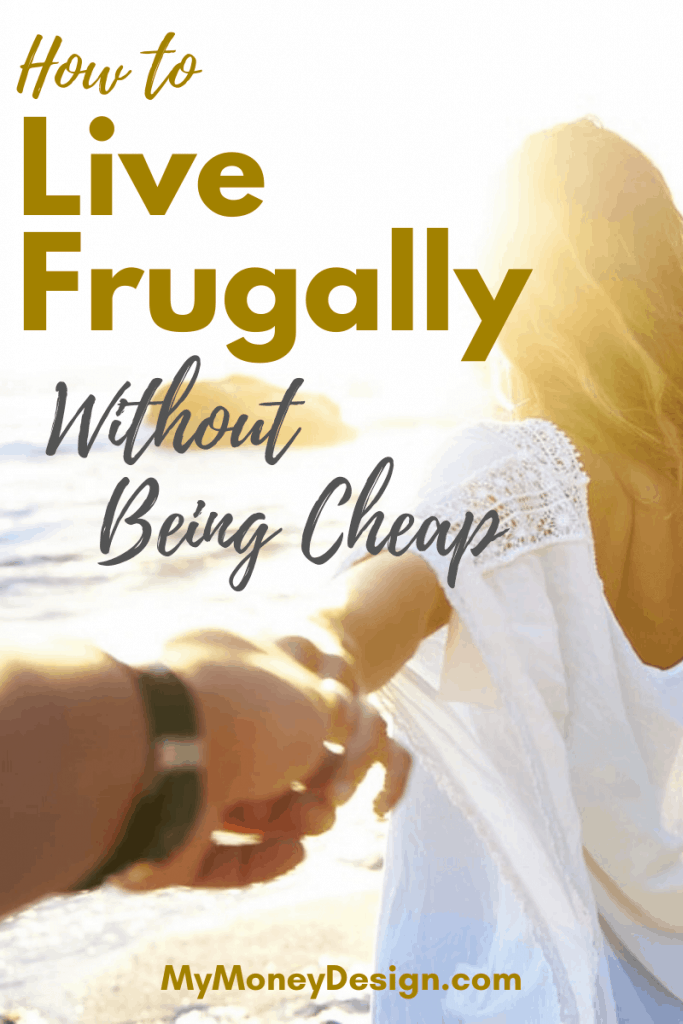
It’s pretty safe to say that if you want to do a better job managing your money, one of the first changes you’re going to need to embrace is how to live frugally.
I know, I know … The word frugal makes most people want to cringe! Why? Because they associate it with another word that brings about unpleasant thoughts: Cheap!
I think we can all agree – no one wants to be thought of as “cheap”. And for good reason. The idea of people being cheap implies that they are being stingy with their money. It means you hold yourself back from buying the things you want or even need, and for no good reason. That’s not how you want to be!
“Frugal”, on the other hand, implies that you are simply being conscious of your money and making careful choices when it comes to your purchases. It doesn’t mean you’re not going to buy stuff. It means you’re going to buy stuff for the best price possible. I’ve had so much luck with this over the years on lots of big purchases:
- Buying our new house for $75,000 below the original list price.
- Negotiating a price of 25% less than the original quoted price for the land next to our old house.
- Taking the family on a vacation to Maui in Hawaii for over $5,000 less than what it should have cost.
- Buying the guitar I wanted for half of what it sells for brand new.
- Buying a high quality watch for nearly half of the retail price.
- .. And so many other examples!
I think all of us could stand to be a little more mindful when it comes to how we spend our money. In fact, according to the blog Get Rich Slowly, one very interesting statistic they found in a survey from the National Bureau of Economic Research is that nearly two-thirds of people wish they had saved more money over their lifetime.
Think about that for a minute … Over 66% of people wish they had made better financial decisions that would have enabled them to save more of their income.
This is why I believe it is more important than ever to develop the skills that will make you more strategic each and every time you decide to whip out your credit card and make a purchase.
So how can you start making some changes in your own financial habits? Here’s a few of the major areas that will make the biggest impact in your life and enable you to start living more frugally without having to be cheap about it.
Ignore How Everyone Else Lives (or Appears To Live)

First things first, if you want to start living frugally, you need to do one major thing: Ignore how everyone else spends their money.
Forget what fancy clothes they wear. Forget about what flashy cars they drive. Forget what big house or prestigious neighborhood they live in. Forget what exotic vacations they take.
Do yourself a favor and get out of the “If they can have that, why can’t I?” mind-set. You need to do what works for you when it comes to your money.
Why Are You Being Frugal In the First Place?
I’m going to guess its because you either don’t have a lot of money spare currently. Or maybe its because you’ve got something bigger in mind that you’d like to use your money for.
Whatever it is that’s driving your need to develop better financial habits, embrace it! Let it be the “something” that you’d rather spend your money on as opposed to the things in your life which are not nearly as important.
For me, I found my motivation years ago when I made the decision that financial freedom was the greatest thing I could ever buy with my money. If I could rapidly build up my nest egg while keeping my expenses down, then I’d surely be able to shave 10 to 20 years off of the number years I’d need to work relative to my peers.
Achieving financial freedom has been my main financial priority for years. I take comfort in knowing that this is what I truly want for myself and my family, and that most of the other things that other people get excited about seem to pale in comparison. Every time I start to feel myself becoming envious of the lavish lifestyle of others, I remember that I have a higher goal in mind, and then I get back on track.
Chances are you have a higher goal in mind too. Make it your top financial priority and you’ll be amazed at how much easier it is to ignore all the financial noise in your life.
Work With Your Budget

One of the best ways for anyone of any income level to start living more frugally is to make sure they are living well within their means. To do this, you need to take a close look at your budget and make sure your expenses are not exceeding your income.
Don’t have a budget yet? The good news is that it doesn’t take much to get started. Budgets don’t have to be anything fancy. You can literally create one in minutes on a sheet of paper or computer. Google Docs even has templates you can use for free.
All you need to do is make a list of all your expenses, and then compare this to your income. If your income is greater than your expenses, then you’re doing good and can focus on improving. If your expenses are greater than your income, then you’re in financial danger and need to make some changes to your spending soon.
For anyone already using a monthly budget, click here to see why I prefer to use an annual budget instead.
Businesses small and large do exactly this sort of thing all the time. Every year, they make a forecast of their revenue, their known expenses, and then anything else they may want to invest in (expansion, hire more people, develop new products, etc.) As individuals, we should also use the same care and planning to decide how we want to use our incomes to improve our lives.
Redefine the Word “Budget”
The word “budget” tends to scare a lot of people because they think it is something that is going to hold them back from buying the things they want. But this is completely the wrong way to look at it.
By definition, a budget is a plan for how you will spend your money (relative to your income). You always get to decide what’s important to you and what you would like to use your money for. If your money is going towards things that don’t matter to you or are not important, than you need to work towards cutting them out of your budget as soon as possible so that you can start using your money on the things you really want.
Again, this is a question of what your financial priorities are in life. It’s up to you to decide how you’d like to spend the money you’ve worked so hard to earn. And a budget is just an organized way to help you work through the numbers to get there more efficiently.
Challenge All Your Expenses
Okay, so you’ve made your budget and need to do better with your spending. What’s the best way to do this?
Personally, the way I like doing this by always challenging all my bills. Pick any 3-5 of your expenses and start looking for any possible way you can reduce them. Over the years, I’ve been incredibly surprised by the results:
- Refinancing our mortgage to save over $70 per month
- Switching auto insurance providers and saving almost $57 per month
- Ditching traditional cable for streaming TV instead and cutting our costs down by $95 per month
- Switching cell phone plans to save an extra $40 per month
And the list goes on and on!
The trick to all of this, however, is never to compromise on quality or service. Just because I’m spending less for something doesn’t necessarily mean it has to be not as good. It just means I have to try a little harder to find someone who will give me a better price for the same thing.
Frankly, I almost make a game out of seeing how well I’m able to find the same service but at a more competitive price.
Remember That All Prices are Negotiable
If there’s anything I’ve learned about being in sales, its that the price of everything is negotiable. Nothing is ever set in stone. Whenever you’re willing to buy something, there’s always more than one person willing to sell it to you. And the best thing you can do is find out who’s going to offer you the most attractive price!
My rule of thumb for most larger purchases is to get at least 3 quotes. This is particularly useful when I need some work done around the house. After doing some research and picking at least three contractors with good reputations, I’m always amazed at how at least one of those quotes will come back much, much cheaper than the others.
Even then, sometimes I’ll call the contractor back and ask if they can take 5 or 10% off the quote to be more competitive. More often than not, they’ll usually agree.
The same goes for making smaller purchases online. It’s crazy how one website may be tens or even hundreds of dollars less than another.
My advice: It pays to do some research, find the best price, and then do some negotiation to do even better.
Redefine How You Have Fun

One of the biggest reasons we as humans tend to spend money is because we’re simply bored and want something to do.
If you don’t believe me, the next time you’re at an airport, just look around you at all the luxury boutique shops and ask yourself who keeps these places in business. The answer: Thousands and thousands of daily travelers who are waiting to board their flights and held captive in these un-entertaining corridors looking for something to do.
We do the same thing in our home lives too. Think about the number of times you or spouse have gone to the mall or some store just to get out of the house for a few hours. While there’s nothing wrong with going to a store, the problem is that once we’re there, we’re several times more likely to buy a bunch stuff we don’t need.
Amazon has made this even worse because now we don’t even have to leave our couches. You can just pull up your phone or tablet and instantly click “Buy Now” on whatever you want.
So how can you avoid this?
How to Avoid Compulsive Shopping
The best way to avoid becoming a compulsive shopper (especially one as a result of boredom) is to simply give your attention to something else!
Find something that interests you and pursue it. This could literally be anything. Here’s a few that I’ve done over the years:
- Playing the guitar
- Go to the gym more and exercise better
- Landscaping our home
- DIY projects inside the home (paint the walls, install hardwood floors, tile work, etc.)
- Passion projects like working on this blog and writing ebooks
Ask yourself: What is something I’ve always wanted to do or learn? It could be:
- Learning a new language
- Developing a new skill set
- Practicing a better diet and health
Again, the choice is yours. And whatever you decide to do with your time, you’re going to be much better at fighting off the temptation to spend money just for the sake of something to do.
Where to Find Free Entertainment
Looking for something fun or entertaining to do?
I’m amazed by how many free or nearly free things there are to do if you just look around. Here’s just a few of the tricks I’ve picked up over the years for finding free entertainment.
- Music. You can use a free app like Pandora or Spotify to stream all kinds of music. This has been a really helpful way for me to discover new bands and experience different types of genres.
- Podcasts. Over the years, I’ve learned a TON of valuable information from Podcasts. There are different episodes for nearly every type of topic or genre you can think of. And the best part is that the information usually comes from just regular people like you or me, so I find it to be more relatable.
- Read. Reading is and always will be a valuable pass-time. Nowadays with ebooks, its even easier to hop on your tablet and check out an ebook from your library or Amazon. Even for just a few bucks, you can buy an ebook on just about any subject you can think of.
- Movies from the library. A lot of people forget that most public libraries have a pretty wide selection of DVD’s that you can check out. This usually even includes new releases!
- Movies from Redbox. Although not free, movies from Redbox come pretty darn close. Ever since creating an account with Redbox, I receive weekly emails with promo codes for discounts. Most of the time my rental costs less than $1.
- Free concerts. Parks, coffee houses, and restaurants are always organizing local music events that are generally free of charge. Look around on Facebook or the Internet and you’ll be surprised at what’s out there.
- Parks. If you’ve got children, a trip to the park can be a great way to spend the afternoon.
- Museums. A lot of museums will offer certain days of the week where admission is reduced or free.
Again, look for things that interest you. The more vested you are in something you want to do, the more the experience will mean to you – regardless of the cost!
Eat a Better Diet

If there’s one other area of life that more people should be focused on other than money, I would say it should be on what they eat. And it’s no surprise that this goes hand-in-hand with your finances too.
While it can be more convenient to eat out at restaurants or even fast food, you’re usually not doing your finances or diet any good. Even for something as simple as a trip to Subway, it can cost my family of 4 upwards of $50 by the time everyone gets what they want. That’s crazy!
Instead, try cooking more meals at home. Not only will you have more control over the ingredients (and therefore the quality of what you’re cooking), but it will surely cost a whole lot less than one meal out.
How can you keep from over-spending at the grocery store? Just like budgeting your money, make a list of all the meals you plan on cooking for the week. Then you’ll be more inclined to only purchase the things you need to make that meal instead of a lot of “extras” that will probably sit in your cupboards or go bad.
If you don’t mind left-overs, start cooking bigger meals. That way you’ll have something for lunch or even dinner the following day.
If you really want meat in your food, opt for chicken or pork. These types of meats are often a whole lot cheaper than steak. And they’re a lot healthier for you too.
Get Paid For Every Purchase You Make

One of the most under-utilized tricks to living more frugally is to get paid for each and every purchase you make. There are a number of ways to do this.
My favorite way to get paid for shopping is to use cash-back credit cards. I’ve had the Fidelity Rewards credit card for years which pays me 2% cash-back on everything I buy. Chase and Discover card also have offers where they’ll pay 5% back on certain categories.
You don’t have to stop there. There are a number of shopping websites that now give you some percentage off just for clicking on them before you make the purchase. And yes, you can double-down and then pay with a cash-back credit card.
Every year, this adds up to thousands of dollars in free points that I can use for straight cash back, or two of my other favorite things: Free travel and presents..
Travel the World for Next to Nothing!
A few years ago, I started noticing a lot of blog posts about people traveling the world for almost free using nothing more than their credit card points. I started learning how I can do the same thing, and the results were amazing!
Although it took a little bit of effort and planning, I found that there was an incredible amount of deals out there that were just waiting to be gobbled up. My family and I have traveled to Mexico, Hawaii, Florida, Alabama, New York, and Las Vegas, and most of it was done for pennies on the dollar. I don’t intend on paying full price for any flights or hotels ever again.
Learn more about how I use travel rewards for free travel at this post here.
Buy Presents With Your Rewards
Most people get frustrated or annoyed when it comes time to buy presents for Christmas or birthdays. But thanks to credit card rewards, we don’t have this problem.
I like to save up my cash back rewards and let the balance build all year long. Then when the time comes, I redeem them for gift cards or physical gifts. A lot of times, the gift cards are discounted, so I get even more bang for my buck!
Buy Higher Quality
Here’s something you won’t hear from most personal finance gurus: When you’re going to buy something, don’t always go for the cheapest option. Buy the item with the best quality and ratings.
But won’t that cost more? Maybe. But in the long run, it will save you more money.
I’ve found this to be true every time I bought something that was “cheap”. Take buying a new washing machine for example. When we had our first house, I would buy the cheapest one at the store. Within a year, it would already need some kind of repair. Within a few years, it was already time to replace it.
For all the times I’ve spent a little extra money to get a reputable brand or a product with high ratings, I’ve had much better luck and far fewer problems.
Keep in mind: High quality does NOT always mean the most expensive choice. There are lots of products out there with good brand names but terrible reviews. Again, it really pays to do some research online before you make any purchases.
Care Less About What You Drive

When it comes to automobiles, the car manufacturers have done an excellent job marketing to us and appealing to our egos. They’ve made us believe that status and “being cool” can be ours when we sign the papers for our new car.
But in reality, things are quite different. Most of the time a car is just a car. It’s really nothing more than a tool to get you from point A to B, and someday (soon) that tool will wear out and need to be replaced.
That’s why the best thing you can do is not spend a dollar more than you have to. Find something reliable and dependable, and at the best price possible.
Again, ignore what everyone else is doing and driving. Don’t be fooled into thinking that your vehicle makes you who you are. It’s not worth it to buy an $80,000 SUV when a different one for $30,000 can do the same exact thing.
Buy Used Vehicles Whenever Possible
When I was in my 20’s, I bought a brand-new SUV off the lot for what felt like an obscene amount of money. Almost 6 years later (not long after it was paid off), the vehicle was having problems and needed to be sold. What did the dealer give me for the trade-in? $1,500.
According to the site How Stuff Works, most vehicles lose approximately 15 to 20% of their value each year. That means a brand-new vehicle with a sticker price of $40,000 would be worth approximately $20,480 after just 3 years.
So put this fact to work for you! The next time you go to buy a vehicle, find one that is approximately 3 years old and in the best condition available. By doing this, you’ll get the most value for your purchase.
Then drive that vehicle for as long as you possibly can!
Downsize Your Home
It’s the American Dream for most people to move the biggest, fanciest house they can find and be the envy of everyone they know.
I know … I had that same mindset and moved from a big house to an even bigger house. And if there’s one thing I’ve learned about living in big houses, it’s that it’s not all it’s cracked up to be.
Here’s just a few reasons why:
- Your taxes are more.
- There’s more stuff inside (like appliances) that will break.
- It costs more to furnish.
- There’s more yard to take care of. Plus you’ll need bigger and more expensive equipment to take care of it.
- It costs more to heat and cool.
And I could go on and on …
My advice to others: If you’re thinking at all about moving to a new house, I would strongly recommend that you consider moving to a house that is just large enough to suit your needs and nothing more.
Pick one that’s in a good neighborhood and appears to be on its way to appreciate for years to come. It also helps to pick one that needs as little updating or upgrades as possible.
Most importantly: Pick one that you can fall in love with. Your home is your castle, and you should wake up every day pinching yourself in disbelief that this awesome home belongs to you.
Photo credits: Unsplash


Leave a Reply